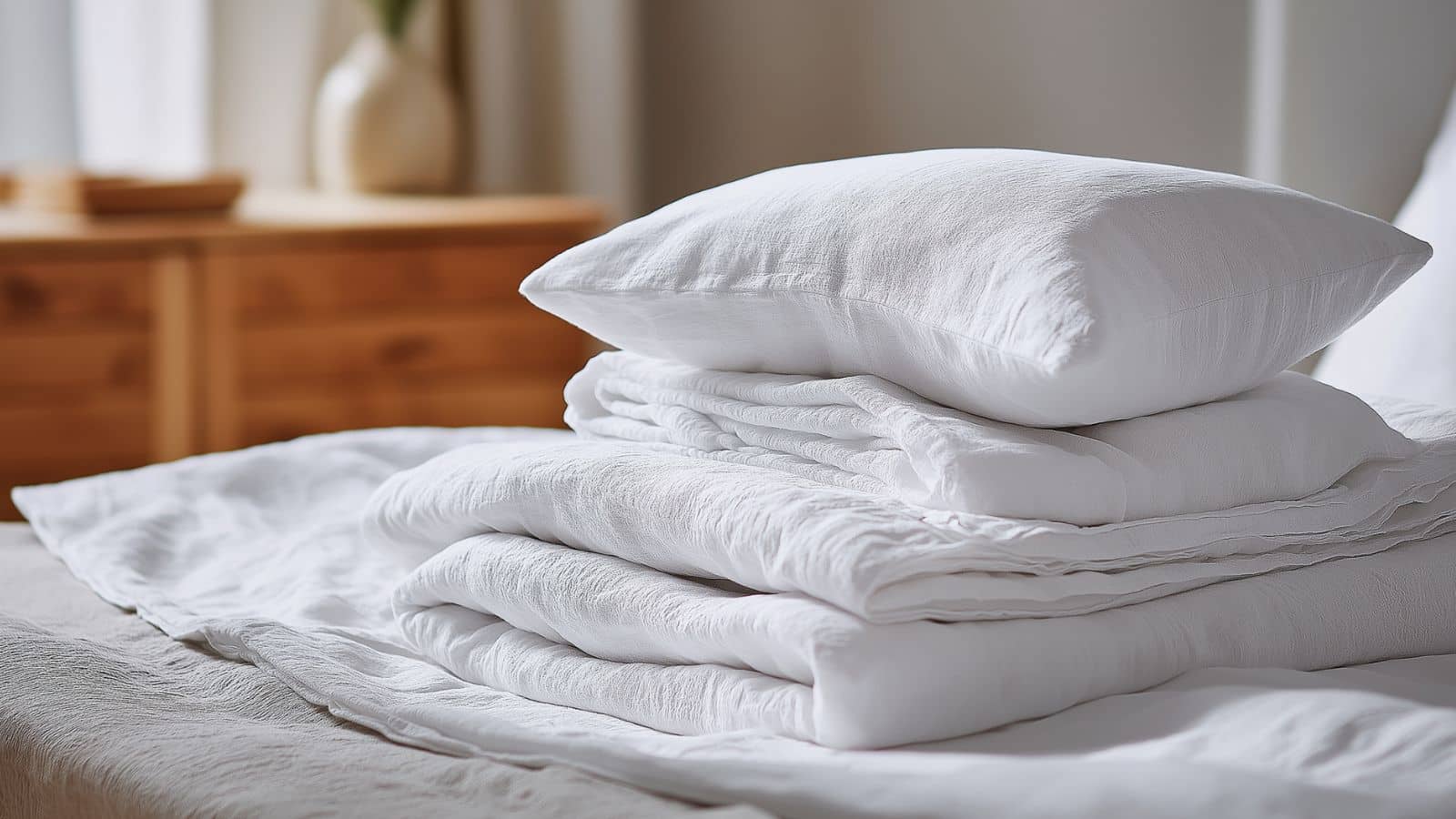Layered Bedding Styling Tips for Cozy Mornings and Effortless Bedroom Charm
Table of Contents
There’s something undeniably comforting about slipping into a well-made, beautifully layered bed—especially on cool mornings when you’d rather stay snuggled under the covers than face the day. Layered bedding isn’t just a design choice; it’s a lifestyle element that combines comfort, function, and aesthetic ease.
According to interior designers and home lifestyle surveys, layered bedding has become a hallmark of cozy, welcoming bedrooms. From boutique hotels to Pinterest-worthy interiors, the art of layering creates depth, warmth, and a sense of intentional luxury. It’s the subtle difference between a bed that’s simply made—and one that invites you to linger just a little longer.
The beauty of layered bedding lies in its flexibility. You can build your base with breathable sheets, add softness with lightweight quilts, and top it off with plush duvets, throws, and decorative pillows. With the right layers, your bedroom becomes a restful sanctuary, styled for both sleep and serenity.
In this guide, we’ll walk through practical and stylish tips for layering bedding that’s not only beautiful but also functional for all seasons. Whether your goal is a warm winter cocoon or a breathable summer bedscape, these styling ideas will help you build a space that supports your mornings with calm and comfort.
Start with the perfect foundation: sheets and mattress layers
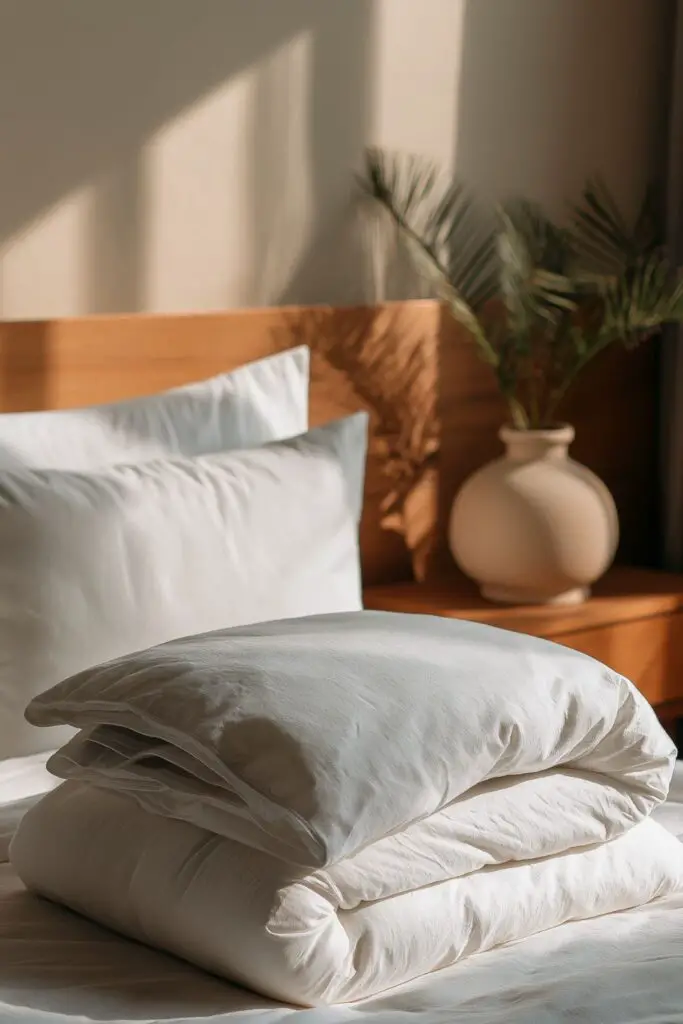
Every beautifully layered bed begins with a clean, comfortable base. This means choosing the right mattress topper and sheet set—not just for appearance, but for sleep quality.
Begin with a supportive mattress topper or mattress pad. It sets the stage for everything that follows by adding extra cushioning or temperature regulation. From memory foam to hypoallergenic down alternatives, the right topper can make a noticeable difference in comfort.
Next comes your sheet set. Cotton percale is crisp and breathable, great for hot sleepers. Sateen has a silky finish, ideal for cooler months or a more polished look. Linen, with its slightly rumpled texture, adds an effortless, lived-in charm and is perfect for layering in all seasons.
Color-wise, start with a neutral base—white, cream, light grey, or soft blush. These hues allow you to build on top with color and pattern without overwhelming the eye.
Table: Choosing Your Bedding Foundation
| Layer | Best Material | Why It Works |
|---|---|---|
| Mattress topper | Memory foam, down alternative | Adds softness and support |
| Fitted sheet | Cotton, bamboo, linen | Comfort and breathability |
| Flat sheet | Cotton percale or sateen | Adds an extra barrier and visual base |
| Sheet color | White, ivory, muted tones | Neutral base for layering |
Layer with lightweight quilts and textured blankets
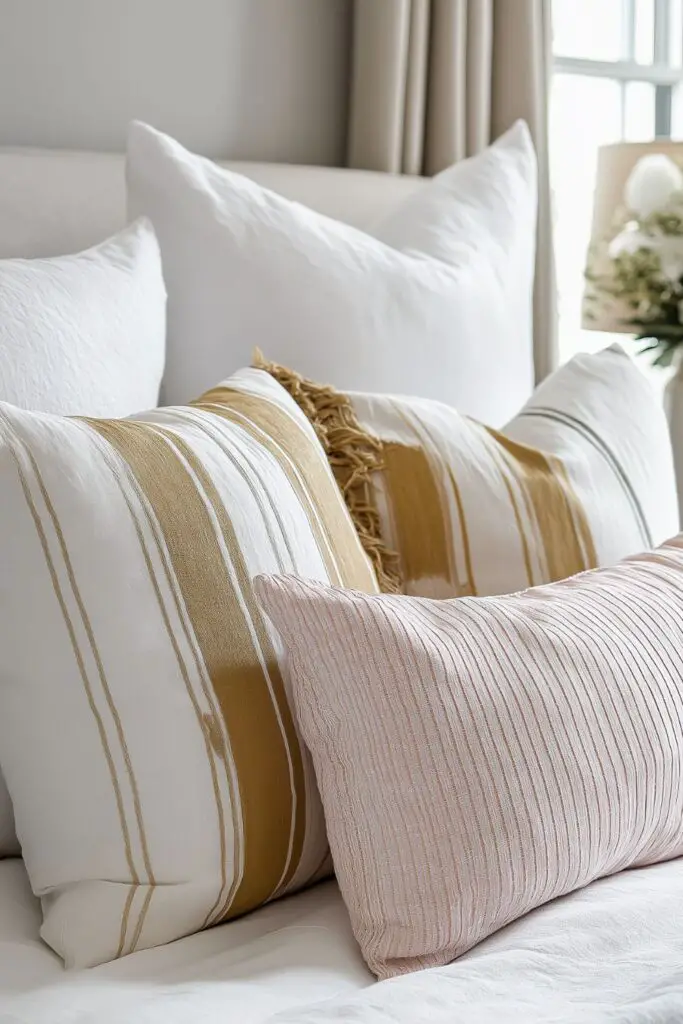
After setting your sheet foundation, it’s time to build the middle layers—the ones that provide warmth without weighing you down. Lightweight quilts and textured blankets are perfect for this role.
Quilts, whether hand-stitched or machine-made, add a touch of tradition and craftsmanship. Choose a single-color quilt in a textured cotton weave for a minimal look, or go bold with a patterned vintage-inspired design for more personality.
Waffle-weave blankets, cable-knit throws, or soft brushed cotton layers not only provide warmth but also visual interest. Layer one folded across the middle of the bed or diagonally at the foot for dimension. For the coziest mornings, mix materials—try layering a waffle blanket over a flat cotton quilt or using a flannel throw as an accent piece.
These middle layers make your bed feel fuller, warmer, and thoughtfully styled while also allowing you to adjust easily for temperature changes.
Table: Mid-Layer Textiles to Add Warmth and Texture
| Layer Type | Material | Styling Tip |
|---|---|---|
| Lightweight quilt | Cotton or linen | Tuck in neatly for tailored elegance |
| Waffle blanket | Cotton-blend | Drape over foot or center of bed |
| Flannel throw | Soft flannel | Adds warmth and color |
| Textured knit | Wool, acrylic | Creates visual softness and depth |
Top it off with a duvet or comforter for plush appeal
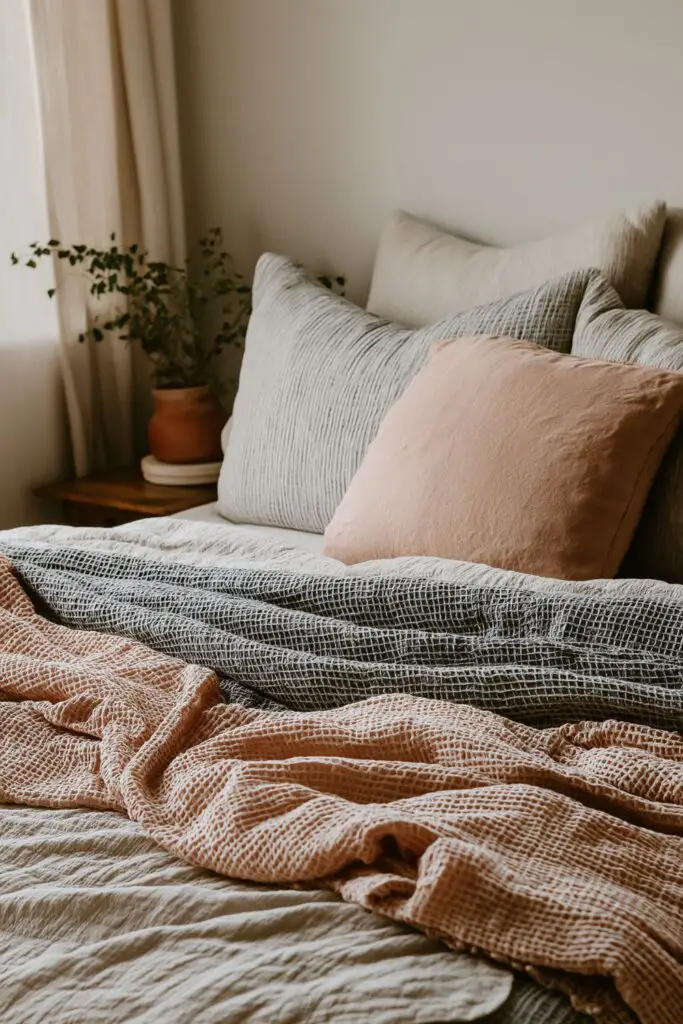
The duvet or comforter is your bedding’s crown jewel—the final, plush layer that ties everything together. It should look inviting and feel cloud-like, especially on mornings when the snooze button wins.
Down or down-alternative comforters provide lofty, all-season warmth and can be styled in multiple ways: fully tucked, casually draped, or folded halfway down the bed to reveal the layers beneath. Choose a duvet cover that complements your palette—solids for simplicity, or soft patterns like botanical prints or tonal stripes for subtle interest.
Duvet covers in linen or washed cotton offer a relaxed look, while sateen adds polish. Keep it light and breathable in summer by using just the cover without an insert, or switch to a heavier fill in winter for ultimate coziness.
Table: Styling Your Top Layer
| Duvet Style | Look & Feel | Best Use |
|---|---|---|
| Fully draped | Cozy and casual | Everyday styling |
| Folded at foot | Hotel-inspired | Showcases under-layers |
| Tucked in | Tailored and modern | Minimalist spaces |
| Patterned cover | Adds focal point | Use with neutral foundation |
Mixing pillows for balance and beauty
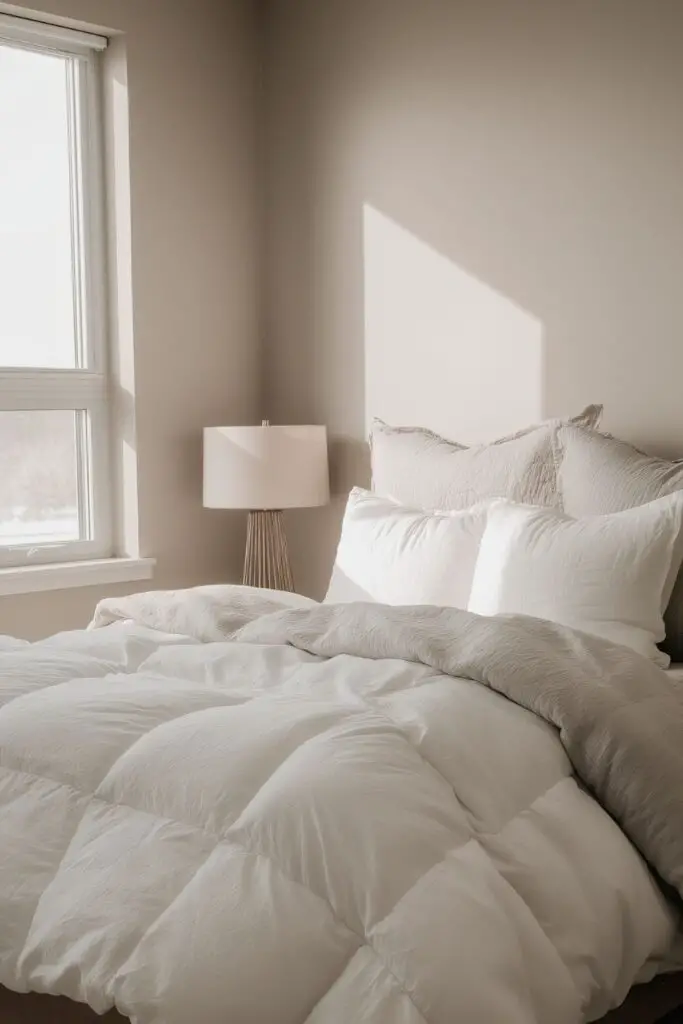
Pillows are more than functional—they’re decorative anchors that elevate your bedding into a styled ensemble. But knowing how to arrange and layer them without going overboard takes a thoughtful approach.
Start with the essentials: two standard or king sleeping pillows placed upright or slightly stacked at the head of the bed. Use pillowcases that match or coordinate with your sheet set.
Add two or three Euro shams (typically 26″x26″) in complementary tones or subtle textures. These add height, structure, and a polished look when placed behind your sleeping pillows.
Next, layer in accent pillows—smaller squares, rectangles, or even round bolsters. Use a mix of patterns, solids, and textures such as velvet, linen, or embroidery. Stick to 2–3 accent pillows to avoid clutter. Odd numbers usually feel more organic and balanced.
Vary the shapes and layer them front to back to create a soft, cascading effect that draws the eye and invites relaxation.
Table: Pillow Layering Guide
| Pillow Type | Size | Purpose |
|---|---|---|
| Sleeping pillow | Standard or king | Comfort and support |
| Euro sham | 26″x26″ | Adds height and symmetry |
| Decorative square | 18″x18″ or 20″x20″ | Brings color and style |
| Lumbar/bolster | 12″x20″ or round | Finishing accent with structure |
Play with color palettes that evoke warmth and calm
Choosing the right color palette is essential for creating a cozy atmosphere. The colors you select will influence the mood and seasonality of your bedroom. For a calming, restful space, go for soft neutrals like ivory, beige, taupe, or pale grey.
If you want a feminine or romantic feel, try dusty rose, mauve, or muted lavender. For earthy warmth, introduce tones like rust, sage green, or ochre. These shades create a cocoon-like effect that feels grounded and soothing.
You don’t need a lot of bold color to make an impact. Use subtle contrasts—a cream quilt with a rose-colored throw, for example—to add interest without overwhelming. Layering within the same tonal family also helps keep the bed visually cohesive.
Table: Cozy Color Palettes for Layered Bedding
| Mood | Color Palette | Best Used With |
|---|---|---|
| Tranquil | White, taupe, soft grey | Scandinavian or minimalist |
| Romantic | Blush, mauve, cream | Vintage or cottage style |
| Earthy | Sage, ochre, sand | Boho or rustic decor |
| Classic | Navy, ivory, charcoal | Transitional or modern homes |
Add seasonal touches for year-round comfort
The beauty of layered bedding is that it allows for seasonal flexibility. As temperatures shift, you can adapt your layers without changing your entire bedding set.
In winter, swap lightweight blankets for wool or faux fur throws. Use flannel sheets in place of cotton and consider a heavier duvet insert. Stick to rich, warm tones—think deep burgundy, forest green, or charcoal.
In spring and summer, lighten up. Remove the top layers, swap in a lighter quilt, and opt for breathable linen sheets. Add floral-printed pillow covers or pastel throws to reflect the season.
This adaptability not only enhances your comfort—it also gives your bedroom a fresh look throughout the year.
Table: Seasonal Layering Swaps
| Season | Add or Remove | Textiles |
|---|---|---|
| Winter | Add heavier duvet, faux fur throw | Flannel, wool |
| Spring | Lighten bedding, add floral accents | Cotton, linen |
| Summer | Remove duvet, use top sheet or quilt only | Linen, bamboo |
| Fall | Reintroduce warm-toned throws | Waffle knit, brushed cotton |
Conclusion
Styling a layered bed isn’t just about aesthetics—it’s about comfort, seasonality, and creating a space that nurtures your morning rituals and nightly rest. With the right foundation, textures, colors, and accents, your bed becomes a haven of warmth and tranquility.
From minimalist neutrals to romantic ruffles, and from crisp cotton to plush throws, layering bedding allows you to express your style while staying cozy in every season. Whether you’re curling up with a book on a chilly morning or refreshing your room for spring, these styling tips help you create a bedroom that feels both timeless and deeply personal.

